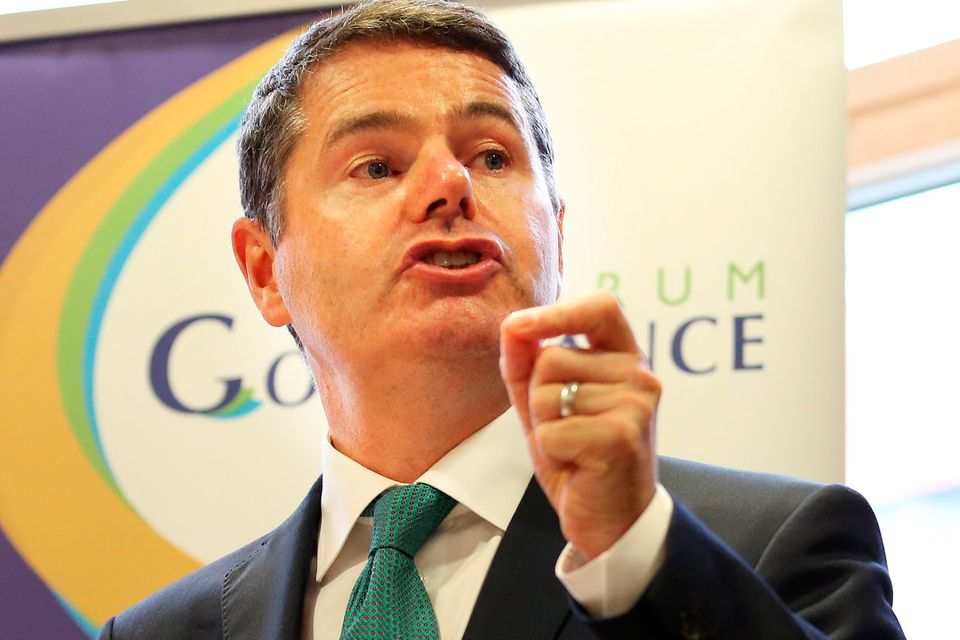Government fears a flood of pay claims if gardaí get deal
Justice Minister says that there will be 'no grandstanding' over talks
Lansdowne Road deal ‘the only deal in town’ Public Expenditure Minister Paschal Donohoe has said Picture: Tom Burke
The Government's determination to keep a lid on public sector pay has put it on a collision course with gardaí.
The Taoiseach, Justice Minister and Public Expenditure Minister have all warned they will not stray from the Lansdowne Road Agreement (LRA), which sets out a timetable for pay rises until September 2017.
They have indicated there is no room for manoeuvre or special deals amid fears that a public sector free-for-all would result.
Taoiseach Enda Kenny urged gardaí "to talk within the mechanisms we have", adding: "It is not possible to do everything that one would wish to do. We simply don't have resources."
It comes as Garda management tentatively began to look at contingency plans for dealing with a withdrawal of services.
It is understood this would involve a request for gardaí from the rank of sergeant upwards to man stations and the lower ranking officers to provide emergency cover.
There has not yet been any formal contact between the Garda Representative Association (GRA) and the Department of Justice about the industrial action.
However, a spokesperson for the GRA told the Irish Independent they have three key demands:
* The restoration of pay relativities and reversal of pay cuts implemented since 2008.
* Reversal of the deferral of increments under FEMPI.
* No additional free hours.
The fast-tracking of pay restoration to pre-recession levels would take gardaí outside the terms of the Lansdowne Road Agreement, which has been signed up to by 20 other unions.
The GRA said last night that 92pc of members had rejected Lansdowne Road and at its conference earlier this week members had "rejected the opportunity to re-enter the LRA".
This leaves them on a direct collision course with the Government, which insisted it would not budge on the issue.
Justice Minister Frances Fitzgerald told the Dáil there would be "no grandstanding" and her door was open for negotiations as early as possible.
"I am in no doubt about the seriousness of the situation. That is why my department has engaged very intensively with the GRA and it is absolutely open, as am I, to meeting to resolve the outstanding issues. It is in the interest of everybody in the country," she said.
However, the Tánaiste added: "Of course, this must be put in the context of the overall public pay situation where 280,000 public servants have an agreement that is in operation that has been worked through with the Government."
Similarly, Public Expenditure Minister Paschal Donohoe, who previously described Lansdowne Road as the "only game in town", said other public sector workers would be closely studying any deal done with gardaí.
Agreement
"What's most important to me is that we have a rate of wage restoration that is affordable.
"Were we to reach a particular agreement on wages for the gardaí, every other public servant would expect that to happen as well," he said.
A spokesperson for the GRA said last night it was "willing to engage in any talks which will lead towards real and tangible increases in pay".
The GRA has been mandated by its conference members to enter talks so there is no requirement to ballot members.
Fianna Fáil's justice spokesman Jim O'Callaghan warned that a "Mexican stand-off" was developing between the Government and the GRA.
He said that cutbacks during the recessionary years had led to "rampant demoralisation and anger in the force".
"The Government has stumbled and stalled with the problems facing An Garda Síochána," he said.
Sinn Féin accused Ms Fitzgerald of adopting a "wait and see game".
Join the Irish Independent WhatsApp channel
Stay up to date with all the latest news













